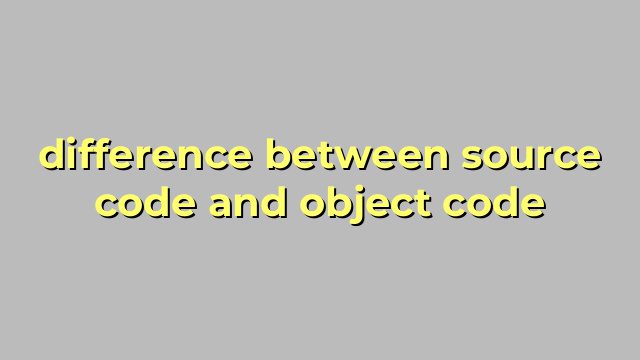The Difference Between Source Code and Object Code
When it comes to software development, understanding the difference between source code and object code is crucial. Source code refers to the raw, human-readable code that programmers write when creating a software program. Object code, on the other hand, is the result of compiling the source code into machine-readable code that is executable by a computer.
Source Code
Source code is the code that software developers write in order to create a program. It is written in a high-level programming language, such as Java or Python, and is designed to be read and understood by humans. The code is usually organized into sections or functions that perform specific tasks or operations.
One of the benefits of source code is that it can be modified as necessary to add new features or fix bugs in the program. However, since source code is not directly executable, it needs to be compiled into object code before it can be run on a computer.
Object Code
Object code is the compiled version of a program’s source code. It consists of machine-readable instructions that can be executed directly by the computer’s processor. Object code is usually in the form of binary code or machine language, which is written in a format that can be directly interpreted by the computer.
Since object code is a direct translation of source code into machine-readable code, it cannot be easily modified by programmers. However, it is much faster and efficient for a computer to execute object code, which is why it is the final product of the software development process.
Conclusion
In summary, source code is the human-readable code that software developers create to make a program, while object code is the machine-readable code that results from compiling the source code. While source code can be modified as necessary, object code is the final product that is executed by a computer. Understanding the difference between source code and object code is essential for anyone involved in software development.
Table difference between source code and object code
| Source code | Object code |
| Human-readable code written in a programming language such as C++, Python, or Java. | Machine-readable code created after the source code is compiled by the computer into binary code. |
| Can be easily edited and modified by programmers using text editors or integrated development environments (IDEs). | Cannot be easily edited or modified since it is in machine language form. |
| Source code is accompanied by comments that aid in understanding the code and make it easier to debug. | Object code does not contain comments and is therefore difficult to read and understand. |
| Code written in the source code is written in a higher-level language (easier for humans to read and write) and is converted into low-level machine language by a compiler. | Object code is already in machine language, which the computer can read and execute directly. |

